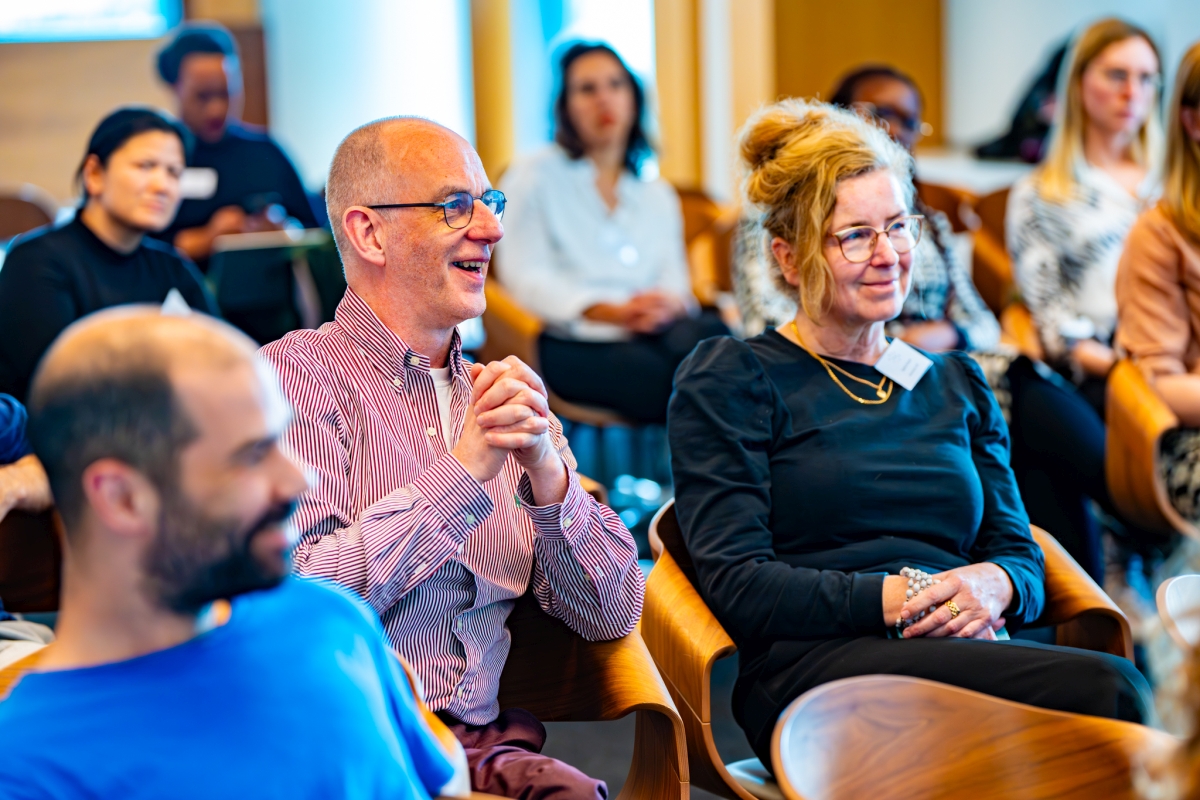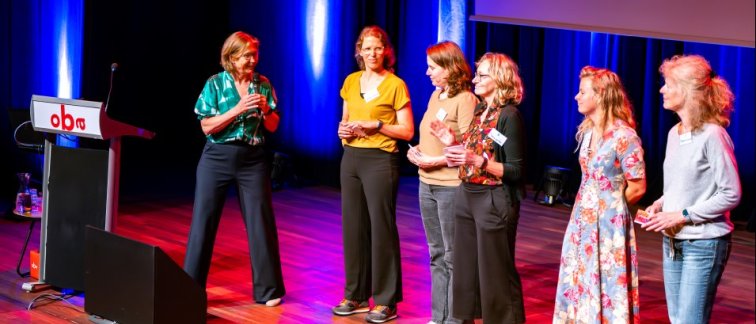Opening
The first Annual Cohort Conference Amsterdam was kicked of by Martine de Bruijne. She showed cohort studies teamed up within the umbrella of the Amsterdam Cohort Hub.
The involved cohort studies provide deep knowledge on the course of health in diverse populations and give insights on how to improve health disparities. The Amsterdam Cohort Hub has six areas of action: 1) Active network, 2) Data infrastructure, 3) Cohort support, 4) Reuse of data, 5) Lobby & PR, and 6) Partnerships. Lastly, she shared our future plans and the new project structure.
 ACH structure & roadmap
ACH structure & roadmap
Keynotes
The power of cohort data: unraveling depression genetics
By Yuri Milaneschi (assistant professor, APH SCQ)
Around 25% of the persons in the Netherlands get a depression at any moment in life. Research indicates that around 40% of the risk of experiencing depression is genetic. Moreover, consistent findings show that depression is a polygenetic trait. A substantial proportion of trait liability is due to the additive effect of multiple variants with small effect sizes scattered across the genome. Due to these small effect sizes, it is of utmost importance to pool data from different depression cohorts around the world to increase sample size. That was one of the reasons to start Psychiatric Genomics Consortium initiative. With a current sample size of more than a million, researchers have identified 223 GWAS hits for depression. One of the current challenges is to combine the power of increasing sample sizes with the precise phenotyping of the concept depression. The Bionic initiative tries to tackle these challenges by harmonizing and the integrating the data infrastructure of different relevant cohorts.
Enriching research data with registry data
By Mandy Spaan (postdoctoral researcher, epidemiologist)
Since clinical cohorts are rich in clinical data but often lack information on early determinants and/or long-term follow-up, it can really help to enrich your data with registry data. To find out if ART (assisted reproductive technology) increases the risk of cancer, and if there is a dose-response relationship with the number of ART cycles, Mandy used the registry data of the Netherlands Cancer Registry and the Dutch Pathology Registry to get data from more than 30.000 women who received ART treatment and about 10.000 women who didn’t get any ART treatment. Reassuringly she found out that there is no increases risk of ovarian cancer after ART. However, there seems to be an increased risk of borderline ovarian tumors after ART, but larger studies with prolonged follow-up are necessary to be sure of this outcome.
Also the long-term health of ART-conceived children was monitored in the nationwide OMEGA offspring cohort, in which there are data of 38.000 no-ART children and 52.000 ART-children. For instance she made a linkage with the CBS data of the national test of educational achievement (Cito test). It appeared that until the age of 12 ART children do perform equally well on primary school compared to no-ART children.
Break-out sessions part 1
State of the art ways of data sharing: myDRE
By Stefan Hermann (RDM consultant for HPC) and Casper de Boer (senior researcher, data steward; ADC)
Given the call to re-use existing data, there is a need for secure platforms to share cohort data with external researchers. Stefan Hermann from the Research Data Management department and Casper de Boer from the Alzheimer Centre (AC) presented the platform that is available for Amsterdam UMC researchers: myDRE. Stefan gave a practical overview of when you should (not) use this platform and on how to get access and set it up. Casper talked about how the AC currently uses this platform to share data with industry and academic partners. There was a lively discussion with the session participants on how myDRE could be further improved. This is encouraging, as it shows that some of the cohorts are already actively sharing their data.
Bridging implementation studies and cohorts
By Esther van Bisschops (PhD candidate Academic Center Viveon; AmsCIS)
Esther Bisschops showed us how she used registry data from a study cohort to evaluate the implementation of the Care and Coercion Act in intellectual disability care. By working together in Communities of Practice using the ItFits toolkit (itfits-toolkit.com) stakeholders were involved in designing the intervention aimed at reducing involuntary care. The goal was to improve the implementation outcomes. Esther discussed the implementation gap – between research and practice: since only stakeholders at organisational level were involved in the implementation planning, rather than stakeholders at practical level, implementation did not improve by working in the Community of Practice.
Data sharing: legal opportunities and challenges
By Irith Kist (data protection officer NKI-AVL)
In this session, Irith Kist emphasized that the GDPR, as a legal framework, does not hamper our work as scientists working on cohorts, but that it is merely the implementation and interpretation of the GDPR that may obstruct our work. She also explained several hurdles related to the sharing of personal data, for example the use of different informed consent forms across institutions. Finally, she gave some solutions that we may expect in the future. For example, with the plans for new legislation regarding the use of unique personal identifiers in research, and what we may expect with the new European Health Data Space.
Garbage in = Garbage out: how to select your measurement instruments
By Wieneke Mokkink (senior researcher EDS; COSMIN)
It is not that easy to select a good measuring instrument for your research. Dr. Wieneke Mokkink from the department of Epidemiology and Data Science confirmed this in her presentation during the break-out session. First of all, it’s important to think carefully about what you want to measure. Examples of questions to consider when choosing the right PROM include: Which aspect of the subject do you want to cover? Is the PROM suitable for your target group? And what is the quality of the PROM?

Break-out sessions part 2
Cohort data as an asset in the context of policy making
By Katinka Prince (GP, chair Amsterdamse Huisartsen alliantie)
Katinka presented the way GPs are organized and how welfare and care organizations work together with the local government and health insurance in Amsterdam Vitaal & Gezond. Amsteram Vitaal & Gezond aims to transform care and welfare to face the challenges set forth in the Dutch Integrated Care Agreement in eight theme coalitions: Elderly, Chronically ill persons, Mental health, Youth & Family, Workforce & Education, Digital Health, Acute Care, and Growth of the city. Amsterdam Vitaal & Gezond aims to ensure equal chances on good health for all in Amsterdam by 2040 and to increases healthy life expectancy for vulnerable persons in Amsterdam with 10 years. With the expected reduction in available work force and increase in chronic disease in the aging population relevant data and insights from research is most wanted.
AI-driven insights in cohort studies
By Athanasios Angelakis (senior research data scientist; EDS) and Mark van de Wiel (chair Big Statistics; EDS)
In two separate talks, Mark van de Wiel and Thanos Angelakis of the Epidemiology and Data Science department presented how Artificial Intelligence (AI) can be applied to gain insights from cohorts, and that ‘big data’ is not a requirement. Mark focused on the additional value of AI in relation to biostatistics, and told about AI methods that make results more interpretable. He presented analyses and results of the HELIUS and ABCD cohorts as examples, as well as results from a collective analysis of multiple cohorts. Thanos gave a general overview of AI in cohort studies. He argued that the relationships in real world (cohort) data are not necessarily linear, and that AI can accommodate analysis of these other relationships in a multidimensional space. Complex data can thus be translated to actionable insights.
Enriching cohort data with registry data
by Sharon Remmelzwaal (postdoctoral researcher; Krachtige Koppelingen)
Why would you collect all the data yourself if you can also link your cohort data to registry data? Sharon Remmelzwaal, from the department of Epidemiology and Data Science, shared her experience emerged from the project ‘Krachtige koppelingen’ with linking cohort data to CBS and STIZON data. Guest speaker, Jeroen Lakerveld, explains the possibilities of enriching cohort data with data of the Geoscience and Health Cohort Consortium (GECCO). GECCO gives the cohorts the opportunity to link their individual-level data with a varied range of environmental data. Overall, it would be great if the cohort hub took a permanent role in the enrichment from cohort data with registry data so cohorts could share knowledge about this and save time and money.
Co-creation and participant perspectives in cohort studies
by Sander Begeer (director NAR)
Sander is director of the Netherlands Autism Register, which has been following autistic individuals over time since 2013. The NAR highly values the input from persons with autism in the whole research cycle, from prioritizing research questions, to obtaining funding, to doing research and reporting their findings.
In this session, Sander gave some inspiring examples about co-creation in the NAR, for example on giving individual feedback about the results to participants in the study, employing specific panel groups of participants to discuss for example genetics research, and on co-creation in education. Finally he showed that participation rates are high as a result of this co-creation.

After the second break-out sessions, this great afternoon ended with pleasant drinks and networking. Special thanks to all speakers, poster presenters, the organization, and all the attendees of this 1st Annual Cohort Conference Amsterdam!
Contact us!
Those interested can request more information about the Amsterdam Cohort Hub or subscribe to the monthly newsflash about it at cohorthub@amsterdamumc.nl.
For more information, see also the Amsterdam Cohort Hub webpage.

